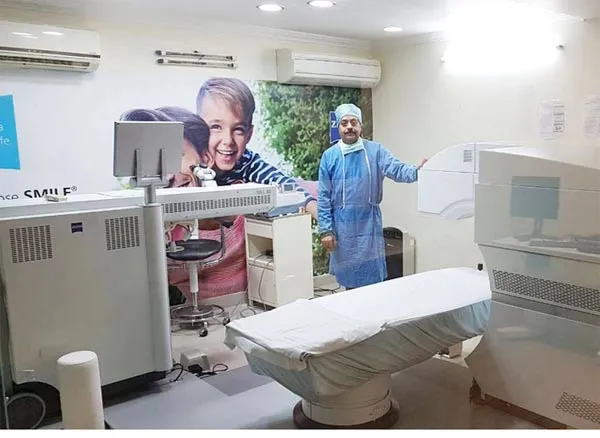Recovery Time After Relex Smile Eye Surgery
Overview
Small incision lenticule extraction is an innovative keyhole laser eye surgery method. It is used to cure different refractive diseases like myopia (nearsightedness), hyperopia (farsightedness), and presbyopia. Small incision lenticule extraction (SMILE) is minimally invasive and does not use the blade in treatment. It can help in managing patients having astigmatism (a condition of the eye in which the curvature of the eye is not proper). It can very successfully replace the very well-known methods of treating refractive errors of the eyes like LASIK, PRP, and LASEK.
What Happens During Smile Eye Surgery?
· Firstly, the doctor will give you a precise dose of anaesthetic eye drops. It is given to numb the eyes. It is done to make sure that the surgery is completely painless.
· After this,several pulses are placed on the centre of the cornea by using a Carl Zeiss VisuMax laser.This step is done by machine and with extraordinarily high precision.
· These pulses form created by the laser create multiple tiny bubbles over the surface of the eye.
· These bubbles are less than one-hundredth of the width of a hair. These bubbles create the outline of the tissues that are intended to be removed.
· The laser forms a small connecting tunnel that allows the surgeon to extract the tissues from the surface of the cornea. It results in changing the shape of the cornea, and as a result, the vision is improved.
Side Effects That We Can Expect After Completion Of The Procedure
Some of the possible complications that you can experience after the completion of the SMILE laser eye surgery are listed below:-
· Dry eye syndrome: It is another common side effect that can happen after the SMILE eye surgery. In this condition, your eyes may feel sensitive. It can generally go away on its own, but patients may need to use a prescribed, medicated eye drop in some cases.
· Double vision: In some conditions, patients may experience double vision after completing the surgery. In this condition, you might see two images of a single object or a show of the object.
· Infection: During the healing process after the surgery, some debris may enter the eye, and this may cause an infection in the eyes.
· Problems in night vision: In some cases, you may also feel some problems in your night vision. Your night vision may be blurry. Due to this condition, the doctor often advises you to avoid driving at night.
What To Expect After The Surgery?
One of the advantages of SMILE eye surgery is that it offers a comparatively faster recovery than other laser eye surgeries. Most patients with the surgery can recover about 80% of their visual abilities within a few hours. This visual ability reaches almost 100% after a few weeks of the Small incision lenticule extraction (SMILE) eye surgery. Another important thing that you also need to know that is your vision might feel temporarily blurred after the surgery. However, it is completely normal, and generally, it is cured on its own and does not lead to further complications.
Some Do’s And Do Not Do’s After The Surgery
· Avoid heavy reading: Reading requires more concentration, which results in increasing pressure on the eyes. So, the doctor may advise the patient to stay away from heavy reading after the surgery.
· Do not drive: Avoid driving after the surgery because you might experience blurred visions after the surgery, resulting in accidents during driving.
· Avoid dust and smoke: try to stay away from heavy dust and smoke after the surgery. It could lead to infections and irritations in the eyes.
· Wear sunglasses after the surgery: Add sunglasses to your accessory after the SMILE eye surgery. It will protect your eyes from foreign particles like dust and other pollutants.
Conclusion
Hopefully, after reading the above article, you now have a brief idea of recovery and care after the Relex SMILE eye surgery. If you are thinking of having SMILE eye surgery, you can go for it. But, do not forget to take advice from the doctor before going for it.

Comments
Post a Comment